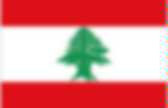

Essential Readings: Reading Lebanon. My dissertation studies intersections and impasses between law and citizenship in Lebanon.
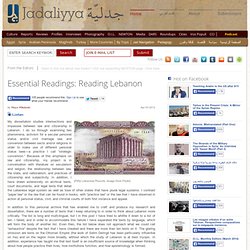
I do so through examining two phenomena, activism for a secular personal status and/or civil marriage law, and conversion between sects and/or religions in order to make use of different personal status laws—a practice I call “strategic conversion.” Because of this emphasis on law and citizenship, my project is in conversation with literature on secularism and religion, the relationship between law, the state, and nationalism, and practices of citizenship and subjectivity. In addition, I have drawn extensively on archival texts, court documents, and legal texts that detail the Lebanese legal system as well as tose of other states that have plural legal systems. I contrast “paper law” or the law that can be found in books, with “practice law” or the law that I have observed in action at personal status, civil, and criminal courts of both first instance and appeal.
Lebanon: The Politics of a Penetrated Society. Political Science. Associate Professor Email: tnajem@uwindsor.ca Phone: 519-253-3000 ext 5020 Office: Chrysler Hall North 1142 Education Ph.D., Durham University (UK), 1997 M.A., University of Windsor, 1993 B.A., University of Windsor, 1991 Courses taught 45-130 Comparative Politics in a Changing World 45-233 Politics of the Developing World 45-235 Government and Politics in the Middle East (Fall 2013) 45-360 International Conflict and Its Resolution (Fall 2013) 45-365 The Middle East in International Relations 45-461 Seminar in Theories of International Relations 45-462 Interdisciplinary Approaches to Research in International Relations 45-566 International Political Economy 45-568 Third World in International Relations (Fall 2013) Research Dr.
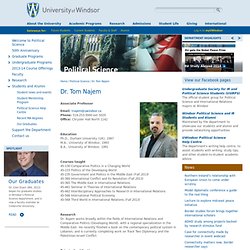
Najem works broadly within the fields of International Relations and Comparative Politics (Developing World), with a regional specialization in the Middle East. Principal publications. Pity the Nation: Lebanon at War: Amazon.co.uk: Robert Fisk. Lords of the Lebanese Marches. MEIS > Faculty > Michael Gilsenan. Michael Gilsenan David B.
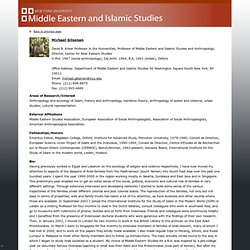
Kriser Professor in the Humanities; Professor of Middle Eastern and Islamic Studies and Anthropology; Director, Center for Near Eastern StudiesD.Phil. 1967 (social anthropology), Dip.Anth. 1964, B.A. 1963 (Arabic), Oxford. Office Address: Department of Middle Eastern and Islamic Studies 50 Washington Square South New York, NY 10012Email: michael.gilsenan@nyu.eduPhone: (212) 998-8875Fax: (212) 995-4689 Areas of Research/InterestAnthropology and sociology of Islam; history and anthropology, narrative theory; anthropology of power and violence; urban studies; cultural representation. External AffiliationsMiddle Eastern Studies Association, European Association of Social Anthropologists, Association of Social Anthropologists, American Anthropological Association.
My current research is the most complex that I have undertaken, and it will be interesting to see what happens. Notes from the Minefield. Interview with Irene Gendzier, author of Notes from the Minefield: United States Intervention in the Middle East, 1945-1958. Irene Gendzier's critically acclaimed, wide-reaching analysis of post-World War II U.S. policy in Lebanon posits that the politics of oil and pipelines figured far more significantly in U.S. relations with Lebanon than previously believed.
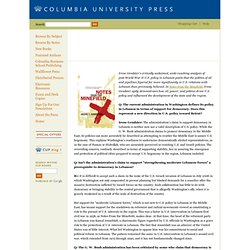
In Notes from the Minefield, Irene Gendzier aptly demonstrates how oil, power, and politics drove U.S. policy and influenced the development of the state and the region. Q: The current administration in Washington defines its policy in Lebanon in terms of support for democracy. Does this represent a new direction in U.S. policy toward Beirut? Irene Gendzier: The administration's claim to support democracy in Lebanon is neither new nor a valid description of U.S. policy. While the G. Q: Isn't the administration's claim to support "strengthening moderate Lebanese forces" a prerequisite to democracy in Lebanon? Q: The G. Q: When did U.S. involvement in Lebanon begin? Q: How well informed is the U.S. public about such developments? That was 1983.